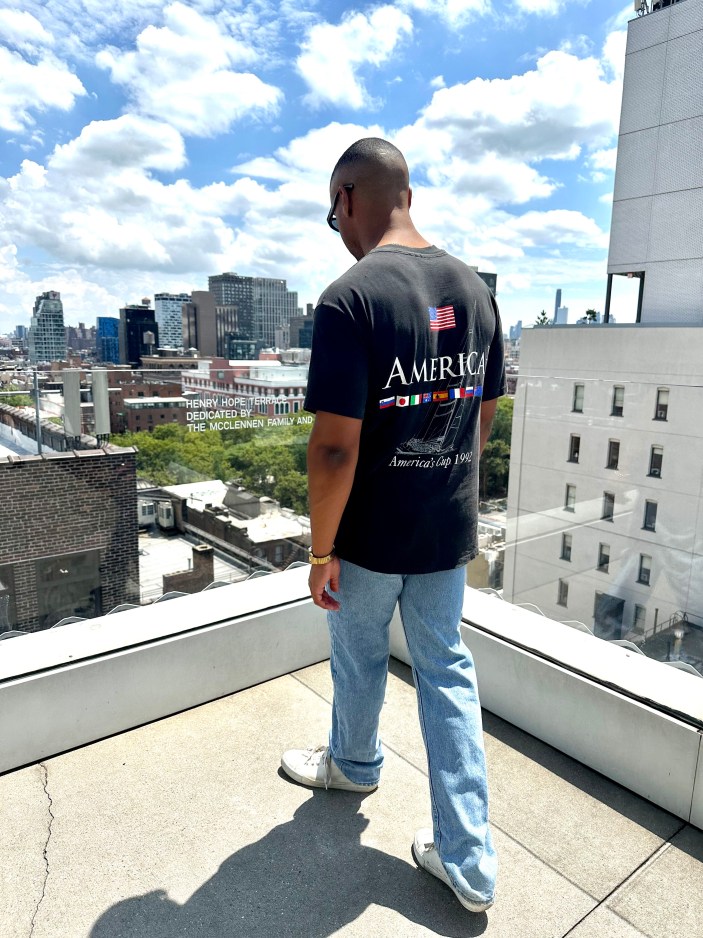“We’re inserting ourselves in the larger history of architecture.”
That idea, a quote from the legendary late designer Virgil Abloh about how he used his master’s degree in architecture in unconventional ways with his design practice, laid the foundation for his successful brands from PYREX VISION to Off-White. That same advice inspired a young black Harvard graduate, Justin McElderry, to create the research and design studio, WorkStudy, and apply his own architectural studies to build a better future.
McElderry had aspirations of being an architect since he was a child, sketching buildings while other kids were more concerned with LEGOs. Once he graduated high school, however, he began his collegiate career at Morehouse University, despite the fact that they don’t have an architectural program. He planned to use this unconventional path to enter architectural studies through networking in Atlanta. In the meantime, he studied economics because, he reasoned, that field could be boiled down to how one chooses to distribute scarce resources. That approach of transferring abundant resources to places where resources are scarce became the foundational knowledge he needed to start thinking about building the world in an atypical fashion.

After graduating from Morehouse in 2015, he began delving more seriously into creative ventures and design work. He gained experience working with clients to build websites, develop graphic campaigns and design album covers. He also launched publikschool.com, a creative accessibility initiative, and built a successful podcast platform, Educated Guess, where he drew upon his pool of interview subjects to expand his creative network. But in his mind, those projects were all a means to an end. The ultimate goal was to show the world that he could execute ideas at any scale. His big break came in 2019 when Adidas hired him to build a pop-up sneaker design school in Atlanta in collaboration with A Ma Maniere for the Atlanta Design Festival. The activation validated his hard work, showing that he could effectively manage projects with globally recognized brands and develop ideas outside of the box that would satisfy client demands and consumer desires.
At the same time, however, that pivotal opportunity served as a wake-up call. Following that massive personal success, he looked in the mirror and realized that he was slowly following a road toward creating a typical ad agency — the sort of rigid, outdated career path he had hoped to avoid from the start. At that moment, he founded WorkStudy, intending to use strategy, art, and design to ask better questions and offer better answers about our collective long-term future.
While sowing the seeds for the research and design studio, Justin also knew it was time to take his aspirations in architecture seriously. So, in the fall of 2020, he enrolled at Harvard, taking classes remotely while continuing to build his network in Atlanta before moving to Boston in the summer of 2021. In his words, Justin noted, “Harvard does a fantastic job of framing architects to be architects, which seems obvious, right? But many people come into the architectural field with aspirations beyond building buildings, myself included. But the onus is really on the individual, in this case on me, to turn the curriculum they put forth into something useful (for alternative means).”

To achieve that goal, he partnered with the Yale-educated architects at Outpost Office, which helped establish a model for his practice, WorkStudy. Their first project was a 5,000-square-foot installation that robots would install for the 2021 Chicago Architecture Biennial. By utilizing his budding architectural education for such a large-scale initiative, Justin was slowly approaching the final stages of realizing his vision.
“I wanted WorkStudy to be a platform for me to tell stories through unique art objects, images, and spatial interventions. The stories that I’m interested in telling are uniquely American and black. I’m not interested in being a ‘black studio’ or the ‘African American expert’ with collaborators, but I recognize that I inherently share and represent a black perspective, which has value.” Justin continued by saying, “I was raised in the Deep South. Harvard might as well be on Mars compared to Birmingham, Alabama. Still, those contradictions inspired me to use this practice to help companies determine the best vehicle to distribute resources creatively.”
His words echo a quote from someone he considers his most influential “distant mentor,” Virgil Abloh, who Justin had a chance meeting with at Miami’s Art Basel in 2019 and once said, “I’m not really into style. I’m more into confidence or having something to say.”

One of the conversations Justin was most interested in having with the world revolves around the way we as a society build and maintain food systems. To that end, he collaborated with the Food Systems Action Lab at the Illinois Institute of Technology to improve what food systems in Chicago look like. To do so, they began by establishing what the local food systems look like in their current form, documenting the problems with research via site visits to gain a better understanding of who would be most affected by the current food systems’ shortcomings, and making radical proposals to shape the agricultural economics of the future positively.
“That’s the political way of saying it,” but Justin simplified it like this, “For years, the food system has been optimized to make a honey bun that you eat in middle school classrooms as cheaply as possible. I want us to think about how we can stop making honey buns, for one (laughs) and two, because honey buns have become way cheaper to make than salads and whole foods, how do we incentivize keeping the costs low so that we can make healthier food more accessible?”
After identifying the levers of finance, policy, technology, and relationships as the keys to creating change, he soon began to recognize himself as someone with the unique background to formulate structured proposals to implement those changes. For Justin, it all goes back to the convergence of his studies in economics and architecture. By exploring and defining the blank space between architecture and atypical solutions, the young entrepreneur is now using WorkStudy to bridge the gap by addressing the practical needs of businesses building a better future more so than physical structures.



